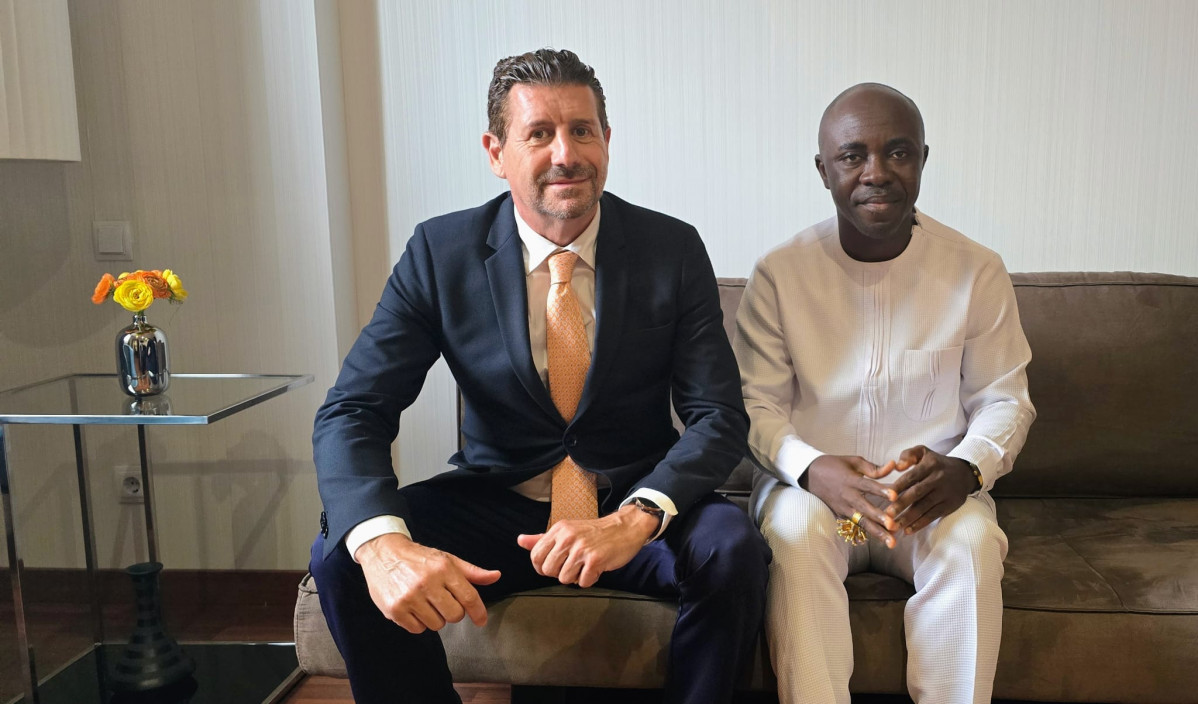Un Puente de Entendimiento y Desarrollo
ART ESP / ING
En un evento que marca un hito significativo para la industria del ocio nocturno global y para el desarrollo económico y cultural del continente africano, el pasado 27 de mayo, Su Majestad Real Oheneba Nana Kwame Obeng II, Rey de la Región de Sefwi Obeng-Mim, Gran Jefe de la Casa Real de Sefwi Obeng-Mim, recibió en audiencia privada a D. Joaquim Boadas de Quintana, Secretario General de la International Nightlife Association (INA) y Vice Decano de la Facultad de Estudios del Ocio Nocturno. Esta trascendental reunión, celebrada en un ambiente de profundo respeto y visión compartida, tuvo como objetivo central debatir "La Evolución del Ocio Nocturno en el Continente Africano: Un Horizonte de Oportunidades y Desafíos", que se ha desarrollado en el boletín del WORLD NIGHTLIFE OBSERVATORY y sentar las bases para una colaboración estratégica entre la INA y las naciones africanas.
La iniciativa de este encuentro surge del creciente reconocimiento del dinamismo y el potencial transformador del ocio nocturno en África. Un continente vibrante, joven y en constante urbanización, donde la música, la cultura y la vida social nocturna no solo son expresiones de identidad, sino también motores económicos y catalizadores de desarrollo.
La Audiencia Privada: Un Diálogo por el Futuro Nocturno de África
La reunión entre el Rey Obeng II y el Secretario General Boadas de Quintana se extendió durante varias horas, abordando con meticulosidad y visión los pilares fundamentales que definirán el futuro del ocio nocturno africano. D. Joaquim Boadas de Quintana presentó un panorama detallado de la visión de la INA para un ocio nocturno globalmente responsable, seguro y sostenible, enfatizando la importancia de la colaboración público-privada y la adopción de estándares internacionales.
Su Majestad Real Oheneba Nana Kwame Obeng II, reconocido por su liderazgo visionario y su profundo compromiso con el progreso de su pueblo y del continente, expresó su particular interés en cómo el desarrollo del ocio nocturno puede ir de la mano con la seguridad ciudadana, la creación de empleo decente y la promoción de la diversidad cultural. El Rey Obeng II, consciente de la energía y el talento de la juventud africana, subrayó la necesidad de proporcionarles espacios de expresión y diversión que sean al mismo tiempo vibrantes y seguros, y que contribuyan al desarrollo económico local sin comprometer los valores sociales.
-------------
In a landmark event for the global nightlife industry and for the economic and cultural development of the African continent, on May 27, His Royal Majesty Oheneba Nana Kwame Obeng II, King of the Sefwi Obeng-Mim Region and Grand Chief of the Sefwi Obeng-Mim Royal House, granted a private audience to Mr. Joaquim Boadas de Quintana, Secretary General of the International Nightlife Association (INA) and Vice Dean of the Faculty of Nightlife Studies. This momentous meeting, held in an atmosphere of profound respect and shared vision, aimed to discuss "The Evolution of Nightlife on the African Continent: A Horizon of Opportunities and Challenges," a topic explored in the WORLD NIGHTLIFE OBSERVATORY bulletin, and to lay the groundwork for a strategic collaboration between the INA and African nations.
The initiative for this meeting stems from the growing recognition of the dynamism and transformative potential of nightlife in Africa. This vibrant, young, and rapidly urbanizing continent sees music, culture, and social nightlife not only as expressions of identity but also as economic drivers and catalysts for development.
The Private Audience: A Dialogue for Africa's Nightlife Future
The meeting between King Obeng II and Secretary General Boadas de Quintana lasted several hours, meticulously addressing the fundamental pillars that will define the future of African nightlife. Mr. Joaquim Boadas de Quintana presented a detailed overview of the INA's vision for globally responsible, safe, and sustainable nightlife, emphasizing the importance of public-private collaboration and the adoption of international standards.
His Royal Majesty Oheneba Nana Kwame Obeng II, recognized for his visionary leadership and deep commitment to the progress of his people and the continent, expressed particular interest in how the development of nightlife can go hand-in-hand with public safety, the creation of decent employment, and the promotion of cultural diversity. King Obeng II, aware of the energy and talent of African youth, underscored the need to provide them with spaces for expression and entertainment that are both vibrant and safe, and that contribute to local economic development without compromising social values.

